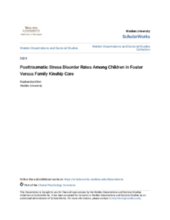This page contains documents and other resources related to children's care in the Americas. Browse resources by region, country, or category.
Displaying 411 - 420 of 1438
The premise of this paper is that Indigenous peoples are multiplicatively oppressed and that these intersecting sites of oppression increase the risk of Indigenous peoples in Canada becoming homeless. The study found that Indigenous identity, involvement in the child welfare system, and level of educational achievement were all significantly associated with experiences of hidden and visible homelessness.
The premise of this paper is that Indigenous peoples are multiplicatively oppressed and that these intersecting sites of oppression increase the risk of Indigenous peoples in Canada becoming homelessness. Hypotheses were tested using the 2014 panel of Canada’s General Social Survey, including 1081 Indigenous peoples and 23,052 non-Indigenous white participants.
This research explains how and why homelessness occurs among youth with serious mental health struggles after aging out of residential and transitional living programmes.
This second of a two-part paper discusses stage two of a two-stage, transatlantic study aimed at identifying and exploring threshold concepts in residential child care.
In this article, the authors examine theoretical and legislative conceptualizations of child neglect in terms of their relationship to the disproportionate involvement of Indigenous children in child welfare across Canada and, more specifically, in Quebec.
This country care review includes the care related Concluding Observations adopted by the Committee on the Rights of Persons with Disabilities and the Committee on the Rights of the Child.
This study uses data from the National Study of Child and Adolescent Well-Being II (NSCAW II) to examine the relationship between separation from siblings in out-of-home care and subsequent offending behavior in adolescence.
This first of a two-part paper discusses the first of a two-stage, transatlantic study aimed at identifying and exploring threshold concepts in residential child care.
This case explores the complex ways unaccompanied Latinx Indigenous minors experience the intersection of immigration policies and U.S. school policies and practices and the implications this has for school leaders.
The purpose of this study was to address the gap in the literature on the full spectrum of posttraumatic stress disorder (PTSD) attributes and symptoms for children living in nonkinship foster homes versus kinship foster homes, as well as examine the benefits and limitations of children placed in kinship and nonkinship foster homes.



